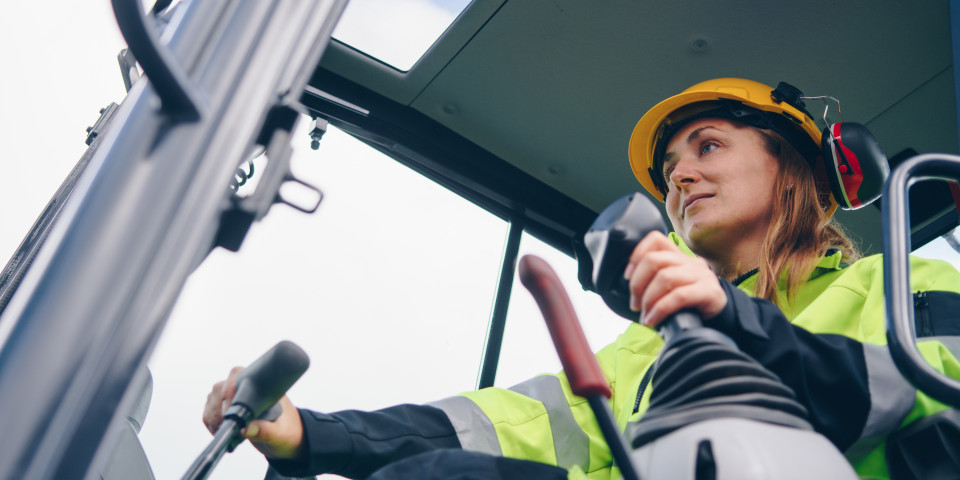Latest News
Women in Construction: a Critical Need for Talent
Posted on Thursday, 14th December 2023

WICA finalist warns diversification is “imperative” as the construction industry faces “a critical need for talent”
The UK construction industry, a cornerstone of nationwide economic development, is in the midst of an unprecedented skills shortage. Catherine Storer, Executive Director of ESS and Woman in Construction Awards (WICA) finalist, believes workforce diversification is a pivotal solution to the problem.
Noting how an ageing workforce is a major contributor to the shortage of experienced professionals, Storer explains: “Diversifying the workforce is a valuable strategy for addressing these challenges, [bringing in] various perspectives, skills and experiences, which can contribute to innovation, increased productivity and a more resilient workforce.”
ESS has trained over 8,500 women in the last 10 years, but Storer knows there is more to be done. With almost 60% of organisations struggling to find the skills they need, the latest Construction Skills Network (CSN) report states that the industry will need 225,000 new construction workers by 2027.
You can’t be what you can’t see
Storer isn’t alone. Kelly Cartwright, owner and Director of Core Recruiter Ltd, says “A push for diversification in the construction industry is crucial.”
Listed in the Top 100 Most Influential Women in Construction for 2022 and 2023, Cartwright works by the line “You Can’t Be, What You Can’t See”, and continually campaigns for bridging the gender gap in the construction industry.
She explains, “Diversifying the workforce in the construction industry can [bring] in a broader range of skills, perspectives, and ideas - helping address the current skill shortages by tapping into a more diverse talent pool.
Diversity and Teamwork
The construction industry is, traditionally, a male dominated field. However, studies have shown that diverse teams consistently outperform homogenous ones, bringing fresh perspectives, innovative ideas, and a broader range of skills to the table.
Storer says that actively welcoming people from all walks of life “is a key component of a broader strategy to address the challenges facing the construction industry.”
According to the ONS, women make up only 15% of the construction workforce in the UK. This underrepresentation reflects deep-rooted societal biases. However, the untapped potential of women in construction is undeniable.
“Women in the construction industry bring valuable contributions through their diverse perspectives, experiences, and problem-solving approaches,” explains Storer, “This diversity of thought fosters innovation.”
Throughout her two decades in the industry, Storer has seen how her female colleagues’ strong interpersonal skills foster effective communication and collaboration within teams.
“These skills enhance teamwork and facilitate better relationships with clients, subcontractors, and stakeholders, ultimately resulting in improved project outcomes.”

Barriers For Women In Construction
Despite these obvious benefits, there is still a lack of gender diversity throughout almost every area. Storer believes that this is, in part, due to a common misconception that the industry is inaccessible and underpaid.
“Some people may believe that construction jobs are inaccessible or exclusively for those with a background in the industry [and] while entry-level positions may have lower wages, skilled tradespeople and experienced professionals in the construction industry can earn competitive salaries.”
Storer adds that another barrier for women “is a lack of career knowledge about the construction industry. This lack of awareness about opportunities and pathways within the sector can discourage women from pursuing education in construction.”
Cartwright, on the other hand, highlights more wide reaching issues - listing the perceived physical demands, lack of career progression and gender stereotypes as some of the myths that discourage women from the industry.
She explains, “Several barriers are encountered when individuals seek upskilling or education in construction … Colleges and training companies play a pivotal role in diversifying and reducing the gender gap in the construction industry.”
Training and Mentorship
ESS is one such company, specialising in the provision of upskilling and training programmes within the sector. Storer says, “Diversifying the construction industry and workforce is a key aim of our company.
“We recognise the immense value that diversity brings to our industry in terms of innovation, creativity and overall performance … We believe that by embracing diversity, we can build a more resilient and dynamic team, better equipped to navigate the evolving landscape of the construction sector.”
Storer agrees that training companies like ESS will play a big role in leading this workforce change, and believes that “companies have a responsibility to provide upskilling opportunities in construction.”
Through offering these opportunities, barriers for women can be removed, paving the way for female success in the sector. By actively promoting the visibility of successful female professionals as role models, we set a precedent that encourages more women to pursue careers in these fields.
Cartwright suggests establishing mentorship programmes that connect women in the industry with newcomers, alongside networking events, can help women feel comfortable and build professional connections.
These initiatives are vital, as they help to level the playing field, ensuring that women have equal access to the resources and support they need to thrive.
“Involving women in the development of construction-related curricula ensures that courses are designed with inclusivity in mind”, Storer notes. “ESS is dedicated to creating an environment where all employees feel valued, respected and have equal opportunities for growth and advancement.
“By offering equal opportunities for career advancement and showcasing successful professionals from diverse backgrounds, construction companies can build a resilient workforce that reflects the broader population.”


